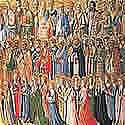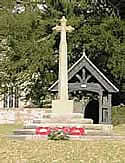 St Mary's Church, Dymock
St Mary's Church, Dymock
| Admin | |||
| . | Home | Contents | |
| H&S Policy | People Safety | Grave Yard | |
The Church & The World
Faith & Care
Faith & Care
Things Past
People & Features
People & Features
Seasons and Festivals

As well as the Seasons and Major Festivals which help us worship God, the church celebrates several 'Special Days' throughout the year to remember, honour and support each other and our work in God's world. Celebration of the "Special Days" is usually optional, Christians chose which they want to remember, not all churches celebrate all these days....
'Special Days'
| January | Plough Sunday | May | Christian Aid Week | September | Racial Justice Sunday Harvest Festival |
| February | Education Sunday | June | Fathers Day Reader Sunday |
October | Disability Sunday Animal Welfare Sunday Hospital Sunday |
| March | Mothering Sunday | July | Sea Sunday | November | All Saints Day,
All Souls Day Remembrance Sunday |
| April | Rogation | August | . | December | Nine Lessons and Carols Christingle Service |
November can be described as 'The Remembrance Season' as it includes....
| All Saints Day (1st November ) | All Souls Day (2nd November ) |
| Remembrance Sunday (2nd Sunday in November) | |

People who have died are 'canonised' by the Roman Catholic Church if they have led an exemplary life, or have been martyred because of their Christian beliefs and have been credited with being responsible for a miracle, either before or after their death. This is the first step towards being made a 'saint'. If that person, either during their life or after they've died, is credited with being responsible for a second miracle, then the Roman Catholc Church decalres them to be a 'saint'. These includes all the Apostles of Jesus (except Judas!), Mary his mother, many people who played a special part in the life of Jesus - such as john the Baptis -and a multitude of 'ordinary people' who have lived an 'exemplary' life since.
All Saints Day was originally celebrated in May, just after the festival of Pentecost, but in the west around 735AD, Pope Gregory III dedicated an oratory* in Rome on 1st November 'for the relics of the holy apostles and of all saints, martyrs and confessors, of all the just made perfect who are at rest throughout the world'. As a result, the celebration of All Saints in the west was moved to November 1st, but in the Eastern Orthodox Churches it is still celebrated just after Pentecost.
November 1st is close to the old Irish pagan holiday of 'Samhain', when the dead were thought to revisit their old homes, and witches, goblins and black cats roamed about. Another name for All Saints is All Hallows, so the night before (October 31st) is known as 'All Hallows Eve', or more familiarly 'Halloween', which is how Halloween became associated with the old pagan ideas of the undead, witches and goblins, etc. .
*The word 'oratory' comes from the Latin 'orare' meaning to pray and is a place (often a building) set aside for prayer.
(Return to Top)

The Roman Catholic Church prays for the souls of the dead that their sins may be forgiven and they will go on to enter heaven and be in the presence of God. The Church of England believes that our sins are forgiven because of what Jesus did for us on the cross, so we enter into heaven immediately on death, so generally it does not pray for the dead but remembers those who have died and gives thanks for them and their life.
In Dymock,we send a personal invitation to the relatives of everyone who ha died recently to come to a special Service on the Saturday nearest All Souls Day to celebrate and remember their relative and their life. The Service includes a period of quiet and a chance to light a candle to remember, and joyful hymns to help us give thanks to celebrate our departed love ones.

Dymock's War Memorial
This particular Sunday is chosen as that being the nearest to the 11th November, which is known as 'Armistice Day'. It was on that day, at the 11th hour of the 11th day of the 11th month, that the Armistice (Latin for 'stoppage') took effect that bought the 1st World War to an end in 1918. Those killed or injured in war are remembered, including both the 1st and 2nd World Wars and all other wars since (Korea, Vietnam, Falklands, Gulf War,Iraq, Afganistan, etc).
It's customary to wear a poppy on your jacket, as that flower was abundant in the killing fields of France in the 1st World War and has been worn as a sign of remembrance and respect for the dead and injured since. In the UK, paper poppies are made and sold by the Royal British Legion, which is the charity that collects money and provides care for injured Service Personnel, the dependents of those killed, and those who spent their life in the armed Services.
Many churches including Dymock hold a special Service of Remembrance on that Sunday including laying wreathes at the War Memorial on the Village Green in front of the Church, reading aloud the Role of the Honour of those who've died in war from our area, and observing two minutes silence as a specific act of Remembrance.
(Return to top)